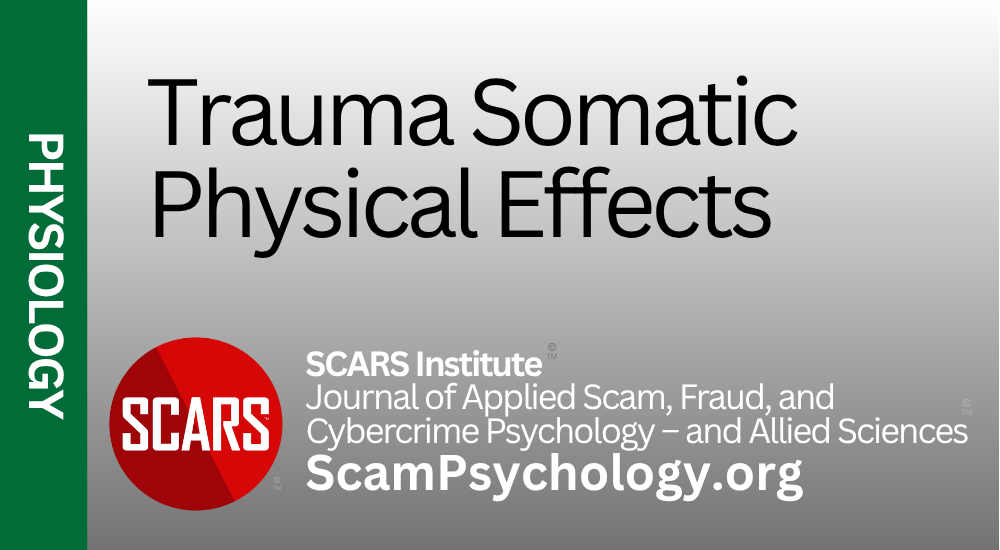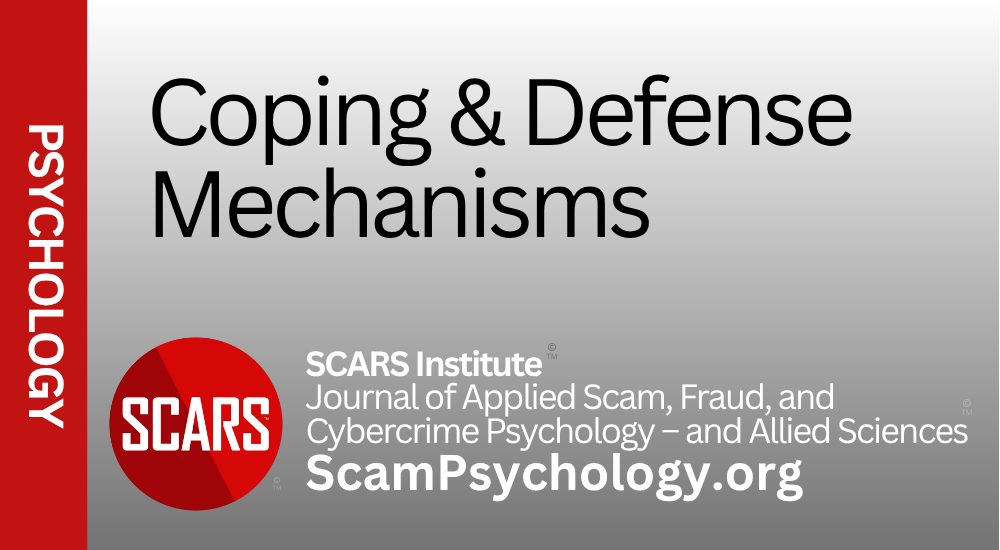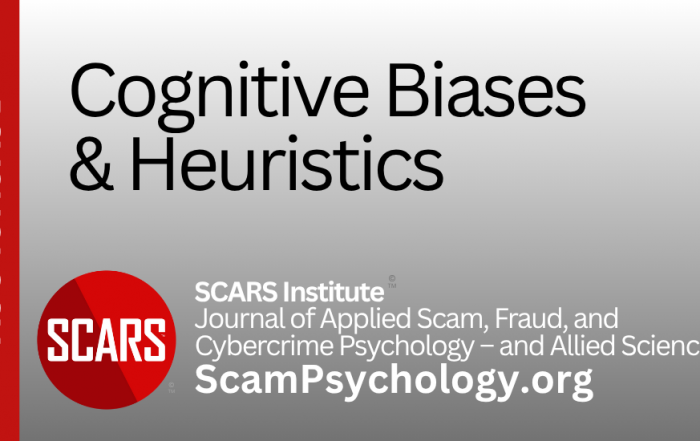Reductive Thinking – A Maladaptive Coping Mechanism*
An Enemy Of Scam Victims Recovery
Principal Category: Scam Victim Recovery Psychology
Authors:
• Vianey Gonzalez B.Sc(Psych) – Licensed Psychologist, Specialty in Crime Victim Trauma Therapy, Neuropsychologist, Certified Deception Professional, Psychology Advisory Panel & Director of the Society of Citizens Against Relationship Scams Inc.
• Tim McGuinness, Ph.D. – Anthropologist, Scientist, Polymath, Director of the Society of Citizens Against Relationship Scams Inc.
* Note: For the ease of our audiences we join coping mechanisms and defense mechanisms together for simplification though we know they are distinct.
Reductive thinking in scam victims is a cognitive coping mechanism where individuals simplify their experience by focusing on self-blame and perceived naivety, neglecting the complex tactics used by scammers. This approach can lead to internalizing the scam as a personal failure, exacerbating feelings of shame and guilt.
Reductive thinking prevents victims from understanding the broader context of fraud, including sophisticated psychological strategies and systemic issues. This narrow focus can isolate victims, making them less likely to seek support or share their experiences, hindering their recovery. Additionally, by attributing the scam solely to personal failings, victims may overlook valuable lessons and protective measures.
Encouraging a more holistic understanding of their experience can help victims move past self-blame, build a healthier recovery process, and empower them to take proactive steps against future scams. Recognizing and addressing reductive thinking is essential for achieving comprehensive recovery and resilience.

Reductive Thinking in Scam Victims: A Potentially Significant Enemy of the Recovery Process
What is Reductive Thinking or Mentality?
Reductive thinking in scam victims is a cognitive coping mechanism where individuals attempt to simplify their experience by reducing it to basic, often self-blaming elements. This tends to involve focusing solely on their perceived naivety or poor judgment while neglecting the complex, manipulative tactics employed by scammers. By distilling their experience down to personal fault, victims may find a straightforward explanation that, while seemingly providing clarity, actually hinders a comprehensive understanding of the situation. This reductionist approach can make victims internalize the scam as a personal failure, exacerbating feelings of shame, guilt, and inadequacy.
As a negative or maladaptive coping mechanism, reductive thinking prevents scam victims from recognizing the broader context of fraud, including the sophisticated psychological strategies used by scammers and the systemic issues that enable such crimes. This narrow focus can isolate victims, making them less likely to seek support or share their experiences, thereby perpetuating their distress and preventing them from accessing the help they need. Additionally, by attributing the scam solely to personal failings, victims may overlook valuable lessons and protective measures that could prevent future occurrences. Encouraging a more holistic understanding of their experience can help victims move past self-blame, building a healthier recovery process and empowering them to take proactive steps against future scams.
Reductive Thinking vs. Minimizing Psychologically
To better understand the reductive mentality, let’s compare it with another negative coping mechanism called ‘minimizing’.
Reductive Thinking and Minimizing are both cognitive approaches that involve simplification, but they operate in different contexts and serve distinct psychological purposes. Understanding these concepts helps in comprehending how individuals process complex information and cope with stressful situations.
Reductive Thinking
Reductive Thinking involves simplifying complex phenomena into their most basic components, often oversimplifying. This approach can be useful for understanding intricate systems by breaking them down into simpler, more manageable parts. However, it often risks oversimplification, potentially ignoring critical details and interactions within a situation.
Psychological Reductivism
Definition: In psychology, reductivism refers to the tendency to explain human behavior and experiences by reducing them to a single cause or factor. This approach can lead to an incomplete understanding of complex psychological phenomena and is detrimental to scam victim recovery.
Motivation: The primary motivation behind reductivism is to achieve clarity and comprehension by eliminating ambiguity. However, this can result in a limited and sometimes misleading perspective.
Example: Explaining depression solely as a result of a chemical imbalance in the brain, without considering psychological, social, and environmental factors, is a reductivist approach.
Minimizing
Minimizing is a cognitive distortion where an individual downplays or dismisses the significance of an event, emotion, or experience. This often serves as a defense mechanism to avoid confronting painful or uncomfortable realities.
Psychological Minimizing
Definition: In psychology, minimizing refers to the tendency to understate the importance, impact, or reality of an event or emotion. It is often used as a way to protect oneself from emotional pain or cognitive dissonance.
Motivation: The motivation behind minimizing is often to reduce psychological distress by avoiding or downplaying negative experiences and emotions. In this way, it is a form of denial.
Example: A person who has experienced a traumatic event might say, “It wasn’t that bad,” or, “Other people have it worse,” to avoid dealing with the emotional impact (traumatic injury) of their experience.
Key Differences
Purpose
Reductive Thinking: Aims to simplify for the sake of understanding complex phenomena, often at the risk of oversimplification. But this can easily lead to misunderstandings because it overlooks the real complexity of events, causes, and effects.
Minimizing: Aims to protect oneself from emotional distress by downplaying the significance of experiences or emotions.
Approach
Reductivism: Breaks down complex systems into their simplest parts, often disregarding the holistic view.
Minimizing: Reduces the perceived impact or importance of an event or emotion to avoid discomfort.
Outcome
Reductive Thinking: This can lead to incomplete or misleading conclusions due to oversimplification of complex issues.
Minimizing: This can prevent individuals from fully processing and addressing their emotions and experiences, potentially leading to unresolved psychological issues.
Psychological Implications
Reductive Thinking: This can result in a limited understanding of mental health issues by failing to consider the multifaceted nature of human experiences. This can lead to treatment approaches that do not fully address an individual’s needs.
Minimizing: Can hinder emotional processing and resolution by avoiding the acknowledgment of distressing experiences. It may lead to chronic stress or anxiety if underlying issues are not addressed.
Examples in Context
Reductive Thinking:
Example 1: Simplifying the Cause A scam victim might reduce their experience to a single factor, such as their own perceived naivety, ignoring the complex tactics and psychological manipulations used by the scammer.
Statement: “I got scammed because I’m just too trusting.”
Implication: This overlooks the sophisticated techniques employed by scammers, such as social engineering and emotional manipulation, and places blame solely on the victim’s trust.
Example 2: Attribution to a Single Event Another instance of reductivism is when victims attribute the entire experience to one moment of poor judgment.
Statement: “It all went wrong the moment I clicked that link.”
Implication: This simplifies the scam to a single action, ignoring the build-up and the multifaceted approach scammers use to gain trust and exploit victims over time.
Minimizing
Example 1: Downplaying the Impact A common minimizing response is for victims to understate the emotional and financial toll of the scam.
Statement: “It’s just money; it’s not the end of the world.”
Implication: This minimizes the severe emotional distress and potential long-term financial consequences, preventing the victim from fully processing their feelings and seeking appropriate support.
Example 2: Comparing to Worse Situations Victims might compare their situation to others’ worse experiences to downplay their own suffering.
Statement: “At least I didn’t lose as much as some people.”
Implication: This minimizes the victim’s own trauma and can inhibit them from acknowledging and addressing their pain, which is essential for healing.
Understanding the distinctions between reductivism and minimizing is very important for developing effective recovery strategies and a comprehensive understanding of scam victim psychology.
The Reductive Thinking in Scam Victim Recovery
Recovering from a scam is a complex and extraordinarily difficult process that extends far beyond financial restitution and usually involves the mind using coping mechanisms to survive. Victims often face profound emotional and psychological challenges as they grapple with feelings of betrayal, shame, and helplessness. One common psychological phenomenon that can hinder their recovery is the reductive mentality. This mindset oversimplifies their experiences and emotions, potentially exacerbating the trauma and slowing down the healing process.
Understanding Reductive Thinking
Reductive Thinking involves simplifying complex issues or experiences into overly basic terms. For scam victims, this might manifest as reducing their multifaceted trauma to simple statements like, “I was just foolish,” or “I should have seen it coming.” Such reductions ignore the nuanced reality of their experiences, including the sophisticated manipulation tactics employed by scammers and the victim’s emotional and psychological state at the time.
How Reductive Thinking Manifests in Recovery
Self-Blame and Guilt: Scam victims often internalize blame, believing that their vulnerability and subsequent victimization were entirely their fault. This self-blame is a reductive way of understanding the situation, ignoring the external factors and sophisticated deceit strategies used by the criminals. Such guilt can prevent victims from seeking support and impede their emotional recovery.
Reducing Emotional Impact: Another way the reductive mentality manifests is through reducing emotional impact. Victims often downplay their feelings of trauma and distress, convincing themselves that they should just “get over it.” This can lead to unaddressed emotional wounds festering over time, potentially resulting in long-term psychological issues like depression and anxiety. This can also occur with ‘minimizing’.
Over-Simplifying Solutions: Victims often also adopt a reductive approach to recovery strategies, believing that simply getting their money back or confronting the scammer will resolve their trauma. While financial restitution is important, it is only one aspect of a comprehensive recovery process. Emotional and psychological healing requires more than just a financial fix; it involves addressing deep-seated feelings of trust violation and fear.
The Role of Reductive Thinking in Hindering Recovery
The reductive mentality can significantly hinder the recovery process for scam victims. By oversimplifying their experiences and emotions, victims might avoid engaging with the full spectrum of their trauma. This avoidance can prevent them from seeking necessary professional help, such as therapy or support providers, which are crucial for holistic recovery.
Additionally, reductive thinking can lead to a cycle of unresolved trauma. Victims who do not fully address their emotional and psychological wounds find themselves more vulnerable to future scams, as their underlying issues remain unhealed.
Reductive thinking is a significant barrier to recovery for scam victims. By oversimplifying their experiences and emotions, this coping mechanism causes victims to delay their healing process and remain vulnerable to future scams. Recognizing and addressing this mindset is essential for achieving holistic recovery. Through professional support, community connection, education, and self-compassion, scam victims can embrace the complexities of their trauma and move towards a healthier, more resilient future.
Tendency to Think in Reductive Terms?
Scam victims tend to think in reductive terms due to several psychological reasons:
Cognitive Dissonance Reduction: Cognitive dissonance occurs when a person holds conflicting thoughts, beliefs, or attitudes, particularly related to behavior and self-perception. Scam victims often experience significant cognitive dissonance as they try to reconcile their self-image as intelligent and cautious individuals with the reality of having been deceived. By simplifying their experience to a notion like “I was just foolish,” they can reduce this dissonance, albeit temporarily, allowing them to maintain a semblance of consistency in their self-perception.
Emotional Defense Mechanism: Thinking in reductive terms can act as an emotional defense mechanism. The complexity of the scam experience and the associated feelings of betrayal, shame, and guilt can be overwhelming. Reductive thinking simplifies these emotions, making them easier to process and manage in the short term. This helps victims avoid the full brunt of their emotional pain, providing a psychological buffer.
Need for Closure: Victims often have a strong need for closure, a psychological term referring to the desire for a firm answer to a question and an aversion towards ambiguity. Scam experiences are typically complex and multifaceted, leading to ongoing uncertainty and discomfort. By reducing their experience to simple explanations, victims can create a sense of closure and finality, even if it is superficial.
Self-Blame and Control: Taking personal responsibility, even inappropriately, can sometimes give victims a sense of control. Thinking “I should have known better” allows victims to believe that if they change their behavior, they can prevent future scams. This perception of control, although misguided, can provide a sense of empowerment in an otherwise powerless situation.
Social and Cultural Influences: Societal attitudes often stigmatize scam victims, labeling them as naive or careless. Internalizing these societal judgments can lead victims to adopt reductive thinking. They might simplify their narrative to fit these societal expectations, minimizing their own experiences and aligning with the cultural script of personal responsibility and blame.
Cognitive Simplification: Human cognition naturally leans towards simplification to conserve mental resources. Processing complex information requires significant cognitive effort. By reducing their scam experience to a simpler narrative, victims can avoid the cognitive load associated with understanding and integrating a complex and painful experience.
Scam victims tend to think in reductive terms as a coping strategy to manage cognitive dissonance, emotional pain, the need for closure, a desire for control, social stigma, and cognitive load. While these strategies may provide temporary relief, they can hinder genuine recovery and healing in the long term.
Cognitive Dissonance Reduction
Cognitive dissonance is a psychological concept developed by Leon Festinger in 1957, which refers to the discomfort people feel when they hold conflicting cognitions (thoughts, beliefs, or attitudes), particularly when their behavior is inconsistent with their self-concept. The theory posits that individuals are motivated to reduce this discomfort by either changing their behavior, adjusting their beliefs, or rationalizing their actions to align with their self-perception.
Application to Scam Victims
Scam victims experience cognitive dissonance when they try to reconcile their self-image as competent, intelligent individuals with the reality of having been deceived and their control taken from them through deception, grooming, and manipulation. This internal conflict is compoumded by feelings of shame, guilt, and embarrassment.
Here’s a deeper look into how cognitive dissonance reduction works in this context:
Rationalization and Justification: Victims can attempt to rationalize the scam by attributing it to external factors.
They might say, “The scammer was really convincing,” or “Anyone could have fallen for that.” This helps them shift the blame away from themselves and reduce the cognitive dissonance by protecting their self-image as intelligent and cautious individuals.
Minimization of the Event: By downplaying the significance of the scam, victims can reduce the emotional impact.
They might think, “It was just a small amount of money,” or “At least I learned a lesson.” This minimization helps to reduce the dissonance between their self-concept and the fact that they were deceived.
Behavioral Change: Some victims can take proactive steps to prevent future scams as a way of coping with dissonance.
For example, they may become more vigilant, educate themselves about scams, or take measures to safeguard their finances. This proactive behavior helps them feel more in control and reduces the dissonance by aligning their actions with a newfound cautious self-image.
Emotional Coping Strategies: Emotional coping strategies such as seeking social support, engaging in self-care, or even humor can help reduce cognitive dissonance. Sharing their experience with others who have gone through similar situations can provide validation and reduce feelings of isolation and self-blame.
Reductive Emotional Defense Mechanisms
Emotional Defense Mechanisms:
These are unconscious psychological strategies used to protect oneself from anxiety, distress, or unacceptable thoughts and feelings. These mechanisms help individuals manage emotional conflict and external stressors, often by distorting or denying reality. They are essential for psychological survival, allowing people to cope with life’s challenges, but they can also impede personal growth and emotional healing if overused or relied upon inappropriately.
Common Emotional Defense Mechanisms
Denial: Denial involves refusing to accept reality or facts, thereby blocking external events from awareness. For scam victims, denial can manifest as a refusal to acknowledge the scam’s impact or even the fact that they were scammed at all. This defense mechanism helps them avoid the pain and shame associated with being deceived.
Rationalization: Rationalization is the process of creating logical explanations for irrational or unacceptable behavior or feelings. Scam victims might rationalize their involvement by attributing it to bad luck or external circumstances beyond their control, thereby reducing personal responsibility.
Projection: Projection involves attributing one’s own unacceptable thoughts, feelings, or motives to another person. A scam victim might project their anger or guilt onto the scammer or even onto friends and family, blaming them for not warning them or helping them avoid the scam.
Repression: Repression involves unconsciously blocking unpleasant emotions, thoughts, or memories from conscious awareness. Victims may repress memories of the scam to avoid the associated emotional pain, which can delay their recovery process.
Displacement: Displacement involves redirecting emotions from a threatening target to a safer one. Scam victims might displace their anger and frustration onto unrelated people or situations, such as family members or minor inconveniences, as a way to cope with their feelings.
Relationship with Reductivism
Reductivism is the tendency to simplify complex issues into overly simplistic terms. When applied to emotional defense mechanisms, reductivism can hinder recovery and self-awareness in several ways:
Oversimplification of Emotions: Victims may reduce their complex emotional responses to the scam into simple terms like “I’m just angry” or “I’m just embarrassed,” ignoring the full spectrum of their feelings. This can prevent them from fully processing and understanding their emotions, leading to unresolved psychological distress.
Minimizing the Scam’s Impact: By adopting a reductive mentality, victims might downplay the scam’s impact on their lives. They might think, “It’s just money” or “It’s not a big deal,” which can prevent them from seeking the necessary support and taking steps to address the emotional and psychological consequences of the scam.
Avoidance of Deeper Issues: Reductivism can serve as a defense mechanism itself, allowing victims to avoid confronting deeper issues such as vulnerability, trust, and self-esteem. By simplifying their experience, they can avoid the uncomfortable process of exploring how the scam has affected their beliefs and self-perception.
Hindrance to Effective Coping Strategies: Effective coping and recovery require a nuanced understanding of one’s emotional landscape. Reductive thinking can prevent victims from developing effective coping strategies that address the full range of their experiences and emotions. This can lead to a reliance on maladaptive defense mechanisms and prolong the recovery process.
Reductive Thinking and Closure
Need for Closure and Reductivism
The need for closure refers to an individual’s desire for a firm answer to a question and an aversion toward ambiguity and uncertainty. This psychological concept plays a significant role in how people process information, make decisions, and cope with complex situations, including experiences of being scammed.
Characteristics of Need for Closure
Desire for Certainty: Individuals with a high need for closure prefer clear, definitive answers and outcomes. They are uncomfortable with ambiguity and seek to quickly resolve uncertain situations.
Discomfort with Ambiguity: Such individuals experience anxiety and stress when faced with ambiguous or unclear situations. They tend to make quick decisions to avoid prolonged uncertainty.
Preference for Order and Structure: A structured environment and orderly processes help individuals with a high need for closure feel more in control and secure.
Relationship with Reductivism
Reductivism is the tendency to simplify complex issues to more easily understandable components, often at the expense of losing essential nuances. The relationship between the need for closure and reductivism is rooted in the desire to reduce complexity and uncertainty, which can be overwhelming.
Simplification of Experiences:
Individuals with a high need for closure may resort to reductivism as a coping mechanism. By simplifying their experiences, they can more easily understand and process what happened, even if it means overlooking important details.
For example, a scam victim might reduce their experience to “I was stupid to fall for it,” which, while partially true, ignores the sophisticated manipulative tactics used by scammers.
Avoidance of Ambiguity:
Reductivist thinking helps individuals avoid the discomfort associated with ambiguity. By reducing a complex scam scenario to a simple narrative (e.g., “All scammers are evil”), they can avoid the unsettling realization that scams can be highly sophisticated and difficult to detect.
This black-and-white thinking can prevent victims from acknowledging their own vulnerabilities or the broader systemic issues that facilitate scams.
Cognitive Dissonance Reduction:
The need for closure can drive reductivist thinking as a way to reduce cognitive dissonance. When the reality of being scammed conflicts with a person’s self-image of being intelligent and cautious, they may simplify the situation to resolve this dissonance (e.g., “It was just bad luck”).
This simplification helps maintain a coherent and stable self-concept by attributing the scam to external factors rather than personal failings.
Impact on Recovery
The need for closure and resultant reductivism can significantly impact a scam victim’s recovery process:
Hindrance to Emotional Healing: By simplifying their experiences, victims might avoid fully processing their emotions. Statements like “I’m over it” can mask ongoing feelings of betrayal, shame, and anger, delaying genuine emotional healing.
Impaired Learning and Prevention: Reductive thinking can prevent victims from learning from their experiences. By not fully understanding how the scam occurred and their role in it, they may not develop effective strategies to protect themselves in the future.
Strained Relationships: Simplified narratives can affect how victims relate to others. Statements such as “You can’t trust anyone” can lead to overly cautious or mistrustful behaviors, straining personal and professional relationships.
Examples of Need for Closure and Reductivism in Scam Victims
Financial Simplification: “I just lost money, nothing more.” This statement reduces the scam’s impact to a financial loss, avoiding the emotional and psychological ramifications.
Moral Simplification: “All scammers are just pure evil.” This black-and-white thinking ignores the complexities of why people scam and the sophisticated methods they use.
Self-Blame Simplification: “I was just naive.” This simplifies the victim’s experience to a personal flaw, ignoring the manipulative strategies employed by scammers.
Overgeneralization: “Everyone is out to get you.” This sweeping generalization is a reductive response to the trauma of being scammed, leading to excessive mistrust.
Reductivist Thinking and Self Blame
Self-blame and control are psychological dynamics that can affect individuals who have been victims of scams.
Here’s a breakdown of how these concepts apply:
Self-Blame
Victims of scams almost always experience feelings of self-blame, which can manifest in several ways:
Responsibility Attribution: They question their own judgment and blame themselves for falling for the scam. This is influenced by hindsight bias, where the victim feels they should have known better in retrospect.
Guilt and Shame: Victims feel ashamed of being deceived or guilty for trusting the scammer. These emotions stem from a belief that they were somehow at fault for the situation.
Identity Threat: The experience of being scammed can challenge one’s self-image and identity. Victims may struggle with feelings of incompetence or vulnerability, which can further exacerbate self-blame.
Control
Control issues arise due to the loss of autonomy and power felt by victims:
Loss of Control: Victims often feel a loss of control over their finances, personal information, and sometimes even their emotional state. Scammers exploit vulnerabilities and manipulate victims, creating a sense of powerlessness.
Restoration of Control: To regain a sense of control, victims might engage in behaviors like obsessively checking financial accounts, seeking reassurance from others, or avoiding situations where they feel vulnerable to further scams.
Thinking in Reductivist Terms:
When victims think in reductivist terms, they simplify complex situations into black-and-white thinking patterns:
Binary Thinking: Victims might categorize themselves as either completely responsible or completely blameless, without considering the vulnerability factors that led to the scam. Of course, they are not to blame, but understanding and accepting why is important.
Overgeneralization: They might generalize their experience to believe that all situations involving trust will lead to negative outcomes, which can impact their future decision-making.
Simplification of Causes: Victims may overly simplify the causes of the scam, attributing it solely to their own gullibility or the maliciousness of the scammer, without considering external factors or societal influences.
Social and Cultural Influences with Reductive Thinking
Social and cultural influences play significant roles in how scam victims perceive and interpret their experiences, often contributing to reductivist thinking patterns. Here’s a deeper look into these influences:
Social Influences
Trust and Social Norms
Trust Dynamics: Social norms and expectations influence how individuals perceive trust and deception. Victims may blame themselves for trusting someone they believed fit societal norms or expectations.
Social Pressure: There can be pressure to conform to social norms related to financial success or security, which may exacerbate feelings of shame or inadequacy when scammed.
Social Comparison
Comparison with Others: Victims may compare themselves to others who have not been scammed, leading to feelings of inferiority or self-blame. This comparison can oversimplify their situation, attributing the scam solely to personal failings rather than recognizing the randomness or sophistication of the scam itself.
Social Support
Impact of Support Networks: The availability and quality of social support can influence how victims cope. Lack of understanding or blaming attitudes from peers or family members can reinforce self-blame, whereas supportive networks can mitigate these feelings.
Cultural Influences
Cultural Values
Individualism vs. Collectivism: Cultural values around individual responsibility versus communal support can shape how victims interpret their experiences. In individualistic cultures, there might be a stronger emphasis on personal responsibility, potentially intensifying self-blame.
Attitudes Towards Victimhood: Cultural attitudes towards victims of crime or deception can vary. Some cultures may stigmatize victims or view them as weak, which can contribute to internalized blame.
Perceptions of Authority and Expertise
Influence of Authority Figures: Cultural beliefs in authority and expertise can impact how victims perceive themselves and others involved in the scam. Victims might defer excessively to perceived authority figures, leading to a diminished sense of personal agency or responsibility.
Stigma and Shame
Cultural Stigma: Some cultures may attach greater stigma to being scammed, viewing it as a personal failing rather than recognizing the sophistication of modern scams.
Shame Dynamics: Shame can be culturally influenced, affecting how victims internalize and cope with their experience. Cultures that emphasize shame over guilt may find it particularly challenging to support victims without further stigmatization.
Cognitive Simplification
Cognitive simplification refers to the tendency of individuals, including scam victims, to reduce complex situations or experiences into simpler, more manageable terms. This process can contribute to reductivist thinking patterns among scam victims, where they may oversimplify the factors contributing to their victimization. Here’s a deeper exploration of cognitive simplification in the context of scam victims:
Types of Cognitive Simplification
Binary Thinking
Black-and-White Perspective: Victims may categorize their experience into simplistic categories of right or wrong, good or bad. For example, they might see themselves as either entirely at fault for being scammed or completely blameless, without considering the nuances of the scamming process or external factors.
Overgeneralization
Drawing Broad Conclusions: Scam victims might generalize their experience to all future situations involving trust or financial decisions. For instance, they might conclude that all online transactions are inherently risky, leading to avoidance behaviors that oversimplify their ability to engage safely online.
Reductionism
Simplifying Causes: Victims may simplify the causes of the scam to a single factor, such as their own naivety or the malicious intent of the scammer. This overlooks the sophisticated tactics used by scammers and the broader societal and technological factors that contribute to scams.
Causal Attribution
Attributing Sole Responsibility: Victims might attribute the entirety of the responsibility for the scam to themselves, ignoring situational factors or the manipulative tactics employed by scammers. This self-blame can be exacerbated by cognitive biases like hindsight bias, where victims feel they should have known better after the fact.
Factors Influencing Cognitive Simplification
Emotional Impact
Stress and Anxiety: Emotional distress following a scam can impair cognitive processing, leading victims to seek quick explanations or solutions that simplify their understanding of the situation.
Fear and Uncertainty: Fear of future victimization or uncertainty about financial security can prompt victims to adopt simplified beliefs to regain a sense of control.
Cognitive Biases
Hindsight Bias: Victims may perceive the scam as more predictable or avoidable after it has occurred, reinforcing a simplistic view that they should have been able to prevent it.
Confirmation Bias: Victims might selectively interpret information to support their simplified beliefs about the scam and their role in it, filtering out contradictory evidence. because of this cognitive bias
Social and Cultural Context
Norms and Expectations: Cultural norms regarding financial responsibility or trust can shape how victims perceive their own actions and the actions of others involved in the scam.
Social Comparison: Comparing oneself to others who have not been scammed can lead to feelings of inadequacy or reinforce simplistic attributions of personal responsibility.
By addressing cognitive simplification and promoting a more nuanced understanding of their experiences, victims of scams can better cope with their emotions, regain a sense of control, and reduce self-blame.
Examples of Reductivist Tendencies in Scam Victims
Scam victims may express reductivist tendencies as a way to simplify and cope with their complex emotions and the trauma of being scammed. These tendencies manifest in various statements and behaviors that reveal an oversimplification of their experiences and feelings. Here are some examples:
Statements Minimizing the Scam’s Impact
“It was just money.” This statement reduces the scam’s impact to a financial loss, ignoring the emotional and psychological distress it caused. The victim may be attempting to downplay the significance of the scam to avoid confronting their deeper feelings of betrayal and shame.
“Everyone makes mistakes.” While this is a true statement, it can be reductive when used to dismiss the severity of being scammed. It glosses over the complexity of the situation and the deliberate deception involved, making it easier for the victim to cope by trivializing their experience.
“I should have known better.” This self-blaming statement simplifies the scam to a personal failure in judgment, ignoring the sophisticated tactics used by scammers. It can serve as a way to avoid feeling vulnerable or powerless by attributing the scam to a lack of personal vigilance.
Statements Denying Emotional Impact
“I’m fine, it doesn’t bother me anymore.” This denial of ongoing emotional impact may be a defense mechanism to avoid dealing with lingering feelings of anger, shame, or anxiety. The victim might be trying to convince themselves and others that they have moved on, even if they haven’t fully processed their emotions.
“I don’t want to talk about it.” Avoidance of discussing the scam can indicate an unwillingness to confront painful emotions. This reductive approach to communication helps the victim avoid reliving the trauma, but it also prevents them from processing their experiences fully.
Simplified Explanations for Complex Situations
“Scammers are just evil.” While scammers’ actions are indeed harmful, this black-and-white thinking reduces the situation to a simple moral judgment. It avoids the complexity of understanding how scams operate and how victims were targeted, which is essential for learning and prevention.
“I can’t trust anyone anymore.” This sweeping generalization reduces the world to a binary of trust versus mistrust. It can be a defense mechanism to avoid future pain but also prevents the victim from rebuilding healthy relationships and trust.
Oversimplifying Recovery Processes
“I’ll just forget about it and move on.” This statement ignores the need for emotional healing and processing of the trauma. It represents a reductive approach to recovery, where the victim tries to bypass the necessary steps of dealing with their emotions.
“Therapy is a waste of time, I just need to stay busy.” Dismissing professional help in favor of distraction reduces the recovery process to merely staying occupied. This can prevent the victim from addressing underlying issues and developing effective coping mechanisms.
Rationalizing the Scam
“They must have needed the money more than I did.” This rationalization oversimplifies the scam as a redistribution of wealth, ignoring the deliberate and unethical nature of the scammer’s actions. It can be a way for the victim to make sense of their loss by attributing it to a misguided sense of charity.
“It was meant to happen, it’s just fate.” Attributing the scam to fate or destiny reduces the complex interplay of factors leading to the scam to a simple predetermined outcome. This can help the victim feel less personally responsible but also prevents them from learning from the experience.
Projection of Blame
“My friends should have warned me.” Blaming others for not preventing the scam reduces personal responsibility and shifts it to external parties. This projection simplifies the victim’s feelings of guilt and vulnerability by attributing their situation to the actions (or inactions) of others.
“If the government did more to stop scammers, this wouldn’t have happened.” While systemic issues do play a role, this statement can oversimplify the personal aspects of the scam, including the victim’s own decisions and interactions. It reduces the situation to a failure of external protections rather than a multifaceted problem.
Overcoming Reductive Thinking
To move beyond the reductive mentality, scam victims must acknowledge and validate the complexity of their experiences. This can involve:
Implications for Recovery
While cognitive dissonance reduction strategies can provide temporary relief, they can also hinder long-term recovery if they prevent victims from fully processing their emotions and accepting and learning from the experience.
Effective recovery involves:
Acknowledging the Experience: Fully acknowledging the scam and its impact is crucial for genuine recovery. This includes accepting the emotional fallout (consequences) and understanding that being scammed doesn’t diminish one’s worth or intelligence.
Seeking Professional Help: Therapy or counseling can provide a safe space for victims to explore their feelings, address cognitive dissonance, and develop healthier coping mechanisms.
Educational Empowerment: Learning about common scam tactics and psychological principles empowers victims, helping them to regain confidence and make informed decisions about their future.
Cognitive Behavioral Techniques: Encourage victims to challenge their cognitive simplifications through techniques like cognitive restructuring, which helps them identify and replace overly simplistic thoughts with more balanced and realistic ones.
Pathways to Recovery
To overcome the limitations imposed by reductivism and emotional defense mechanisms, scam victims can benefit from:
Therapeutic Support: Professional therapy can help victims explore and understand their emotions in a safe and structured environment. Therapists can guide them in identifying and addressing their defense mechanisms and developing healthier coping strategies.
Mindfulness and Self-Reflection: Practices such as mindfulness and journaling can help victims become more aware of their thoughts and emotions. This increased self-awareness can reduce the reliance on reductive thinking and promote a more comprehensive understanding of their experiences.
Education and Awareness: Learning about common emotional defense mechanisms and cognitive biases can empower victims to recognize and challenge these patterns in themselves. Education can foster a more realistic and nuanced perspective on their experiences and emotions.
Support Networks: Engaging with support groups or communities of other scam victims can provide validation and shared understanding. Hearing others’ stories can help victims recognize the complexity of their own experiences and reduce feelings of isolation and shame.
Addressing These Dynamics:
To help victims of scams:
Normalize Feelings: Validate their emotions and assure them that self-blame is common but not justified.
Provide Education: Educate them about common tactics used by scammers and how these tactics exploit psychological vulnerabilities.
Encourage Support: Suggest seeking support from trusted friends, family members, or counselors who can provide perspective and emotional support.
Empower through Knowledge: Empower victims by educating them about resources available for reporting scams and protecting themselves in the future.
Addressing Social and Cultural Influences
Cultural Sensitivity: Recognize and respect cultural differences in perceptions of trust, responsibility, and victimhood.
Challenge Stigma: Work to challenge cultural stigmas surrounding victimhood and educate communities about the complexities of modern scams and their impacts.
Steps to Take
Seeking Professional Support: Engaging with therapists or counselors who specialize in trauma can help victims unpack their experiences and address their feelings in a safe, supportive environment. Professional support can also provide victims with coping strategies to manage their emotions effectively.
Joining Support Groups: Connecting with other scam victims through support groups can provide a sense of community and shared understanding. Hearing others’ stories can help victims realize that their experiences are not isolated incidents and that their emotions are valid.
Educating Themselves: Learning about the tactics used by scammers and the psychological effects of scams can empower victims. Education can help them understand that their victimization was not due to personal failings but rather the result of sophisticated manipulation.
Practicing Self-Compassion: Encouraging self-compassion and kindness can help victims move away from self-blame. Acknowledging that it is normal to feel hurt and betrayed can pave the way for genuine emotional healing.
By understanding these psychological dynamics and addressing them appropriately, individuals can begin to recover from the emotional impact of being scammed and regain a sense of control over their lives.
Sources:
- Baumeister, R. F., & Vohs, K. D. (2004). Handbook of Self-Regulation: Research, Theory, and Applications. Guilford Press.
- Baumeister, R. F. (1998). The Self and Society: Changes, Problems, and Opportunities. Social Psychological Review, 1, 3-18.
- Baumeister, R. F., Dale, K., & Sommer, K. L. (1998). Freudian defense mechanisms and empirical findings in modern social psychology: Reaction formation, projection, displacement, undoing, isolation, sublimation, and denial. Journal of Personality, 66(6), 1081-1124.
- Carlson, N. R. (2013). Psychology: The Science of Behavior. Pearson.
- Cramer, P. (2006). Protecting the self: Defense mechanisms in action. Guilford Press.
- Elliot, A. J., & Devine, P. G. (1994). On the motivational nature of cognitive dissonance: Dissonance as psychological discomfort. Journal of Personality and Social Psychology, 67(3), 382-394.
- Festinger, L. (1957). A Theory of Cognitive Dissonance. Stanford University Press.
- Freud, A. (1937). The ego and the mechanisms of defense. International Universities Press.
- Goffman, E. (1963). Stigma: Notes on the Management of Spoiled Identity. Prentice-Hall.
- Harmon-Jones, E., & Mills, J. (Eds.). (2019). Cognitive Dissonance: Reexamining a Pivotal Theory in Psychology. American Psychological Association.
- Janoff-Bulman, R. (1992). Shattered assumptions: Towards a new psychology of trauma. Free Press.
- Kahneman, D. (2011). Thinking, Fast and Slow. Farrar, Straus and Giroux.
- Kruglanski, A. W., & Webster, D. M. (1996). Motivated closing of the mind: “Seizing” and “freezing.” Psychological Review, 103(2), 263.
- McGrath, A. L. (2017). Coping with cognitive dissonance: A review of cognitive dissonance reduction. Social and Personality Psychology Compass, 11(12), e12329.
- Ryan, R. M., & Deci, E. L. (2000). Self-Determination Theory and the Facilitation of Intrinsic Motivation, Social Development, and Well-Being. American Psychologist, 55(1), 68-78.
- Van Hiel, A., & Mervielde, I. (2003). The need for closure and the spontaneous use of complex and simple cognitive structures. The Journal of Social Psychology, 143(5), 559-568.
IMPORTANT NOTE: This article is intended to be an introductory overview of complex psychological, neurological, physiological, or other concepts, written primarily to help victims of crime understand the wide-ranging actual or potential effects of psychological trauma they may be experiencing. The goal is to provide clarity and validation for the confusing and often overwhelming symptoms that can follow a traumatic event. It is critical to understand that this content is for informational purposes only and does not constitute or is not a substitute for professional medical advice, diagnosis, or treatment. If you are experiencing distress or believe you are suffering from trauma or its effects, it is essential to consult with a qualified mental health professional for personalized care and support.

Welcome to the SCARS INSTITUTE Journal of Scam Psychology
A Journal of Applied Scam, Fraud, and Cybercrime Psychology – and Allied Sciences
A dedicated site for psychology, victimology, criminology, applied sociology and anthropology, and allied sciences, published by the SCARS INSTITUTE™ – Society of Citizens Against Relationship Scams Inc.
TABLE OF CONTENTS
A Question of Trust
At the SCARS Institute, we invite you to do your own research on the topics we speak about and publish, Our team investigates the subject being discussed, especially when it comes to understanding the scam victims-survivors experience. You can do Google searches but in many cases, you will have to wade through scientific papers and studies. However, remember that biases and perspectives matter and influence the outcome. Regardless, we encourage you to explore these topics as thoroughly as you can for your own awareness.
Please Leave A Comment
Recent Comments
On Other Articles
[better_recent_comments number=”5″ format=”{avatar} on {post}: “{comment}” {date}” avatar_size=”20″]
A Note About Labeling!
We often use the term ‘scam victim’ in our articles, but this is a convenience to help those searching for information in search engines like Google. It is just a convenience and has no deeper meaning. If you have come through such an experience, YOU are a Survivor! It was not your fault. You are not alone! Axios!
Statement About Victim Blaming
Some of our articles discuss various aspects of victims. This is both about better understanding victims (the science of victimology) and their behaviors and psychology. This helps us to educate victims/survivors about why these crimes happened and to not blame themselves, better develop recovery programs, and to help victims avoid scams in the future. At times this may sound like blaming the victim, but it does not blame scam victims, we are simply explaining the hows and whys of the experience victims have.
These articles, about the Psychology of Scams or Victim Psychology – meaning that all humans have psychological or cognitive characteristics in common that can either be exploited or work against us – help us all to understand the unique challenges victims face before, during, and after scams, fraud, or cybercrimes. These sometimes talk about some of the vulnerabilities the scammers exploit. Victims rarely have control of them or are even aware of them, until something like a scam happens and then they can learn how their mind works and how to overcome these mechanisms.
Articles like these help victims and others understand these processes and how to help prevent them from being exploited again or to help them recover more easily by understanding their post-scam behaviors. Learn more about the Psychology of Scams at www.ScamPsychology.org
Psychology Disclaimer:
All articles about psychology, neurology, and the human brain on this website are for information & education only
The information provided in these articles is intended for educational and self-help purposes only and should not be construed as a substitute for professional therapy or counseling.
While any self-help techniques outlined herein may be beneficial for scam victims seeking to recover from their experience and move towards recovery, it is important to consult with a qualified mental health professional before initiating any course of action. Each individual’s experience and needs are unique, and what works for one person may not be suitable for another.
Additionally, any approach may not be appropriate for individuals with certain pre-existing mental health conditions or trauma histories. It is advisable to seek guidance from a licensed therapist or counselor who can provide personalized support, guidance, and treatment tailored to your specific needs.
If you are experiencing significant distress or emotional difficulties related to a scam or other traumatic event, please consult your doctor or mental health provider for appropriate care and support.
Also, please read our SCARS Institute Statement About Professional Care for Scam Victims – here
If you are in crisis, feeling desperate, or in despair please call 988 or your local crisis hotline.
SCARS Institute Resources:
- If you are a victim of scams go to www.ScamVictimsSupport.org for real knowledge and help
- Enroll in SCARS Scam Survivor’s School now at www.SCARSeducation.org
- To report criminals visit https://reporting.AgainstScams.org – we will NEVER give your data to money recovery companies like some do!
- Sign up for our free support & recovery help by https://support.AgainstScams.org
- Follow us and Find our podcasts, webinars, and helpful videos on YouTube: https://www.youtube.com/@RomancescamsNowcom
- SCARS Institute Songs for Victim-Survivors: https://www.youtube.com/playlist…
- See SCARS Institute Scam Victim Self-Help Books at https://shop.AgainstScams.org
- Learn about the Psychology of Scams at www.ScamPsychology.org
- Dig deeper into the reality of scams, fraud, and cybercrime at www.ScamsNOW.com and www.RomanceScamsNOW.com
- Scam Survivor’s Stories: www.ScamSurvivorStories.org
- For Scam Victim Advocates visit www.ScamVictimsAdvocates.org
- See more scammer photos on www.ScammerPhotos.com















![niprc1.png1_-150×1501-11[1]](https://scampsychology.org/wp-content/uploads/2025/05/niprc1.png1_-150x1501-111.webp)
Reductive thinking and minimizing certainty was tempting but it doesn’t take much to understand that recovery from being scammed is complicated.
Very good article that explained the differences between reductive thinking and minimizing. I’m not sure but it seems that minimizing a situation is the where our culture directs us. More often than not I have experienced that others seem to want to downplay emotions rather than examine them. This has manifested on more than one occasion making me think that our culture is moving into a direction that will bring more isolation. I have experienced minimizing during an attempt to share my story with someone I trusted that left me feeling ashamed and distraught. After that encounter I have felt unwilling to share again. What I’ve experienced I have labeled Suzy Sunshine attitude. And I encounter it often. These people want everything to be sunny, happy, joyful, gushing and what I find sometimes as false happiness. Being with this type of person is difficult for me, because they prefer to downplay emotions and experiences because it is such a “downer” for them. More often than not I have encountered this type of person which makes me feel like maybe I feel too much.